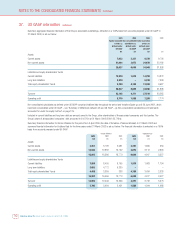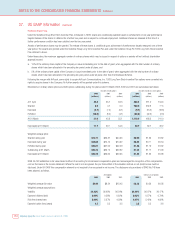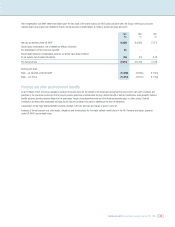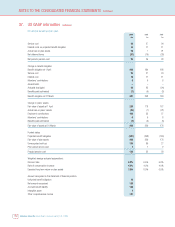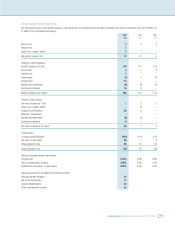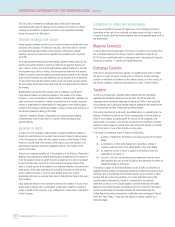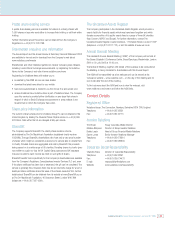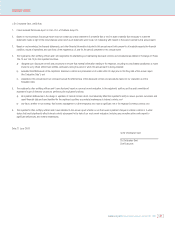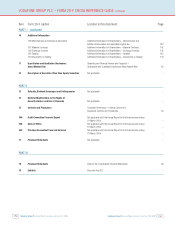Vodafone 2003 Annual Report Download - page 144
Download and view the complete annual report
Please find page 144 of the 2003 Vodafone annual report below. You can navigate through the pages in the report by either clicking on the pages listed below, or by using the keyword search tool below to find specific information within the annual report.
Vodafone Group Plc Annual Report & Accounts and Form 20-F 2003
142
ADDITIONAL INFORMATION FOR SHAREHOLDERS Continued
The City Code on Takeovers and Mergers also contains strict disclosure
requirements with regard to dealings in the securities of an offeror or offeree
company on all parties to a takeover and also to their respective associates
during the course of an offer period.
General meetings and notices
Annual general meetings are held at such times and place as determined by the
directors of the Company. The directors may also, when they think fit, convene
an extraordinary general meeting of the Company. Extraordinary general
meetings may also be convened on requisition as provided by the Companies
Act 1985.
An annual general meeting and an extraordinary general meeting called for the
passing of a special resolution need to be called by not less than twenty-one
days’ notice in writing, and all other extraordinary general meetings by not less
than fourteen days’ notice in writing. The directors may determine that persons
entitled to receive notices of meetings are those persons entered on the register
at the close of business on a day determined by the directors but not later than
21 days before the date the relevant notice is sent. The notice may also specify
the record date, which shall not be more than 48 hours before the time fixed for
the meeting.
Shareholders must provide the Company with an address or (so far as the
Companies Act allows) an electronic address or fax number in the United
Kingdom in order to be entitled to receive notices of shareholders’ meetings and
other notices and documents. In certain circumstances, the Company may give
notices to shareholders by advertisement in newspapers in the United Kingdom.
Holders of the Company’s ADSs are entitled to receive notices under the terms of
the Deposit Agreement relating to the ADSs.
Under the Company’s Articles of Association, the annual general meeting
of shareholders must be held within 15 months of the preceding annual
general meeting.
Variation of rights
If, at any time, the Company’s share capital is divided into different classes of
shares, the rights attached to any class may be varied, subject to the provisions
of the Companies Act, either with the consent in writing of the holders of three
fourths in nominal value of the shares of that class or upon the adoption of an
extraordinary resolution passed at a separate meeting of the holders of the
shares of that class.
At every such separate meeting, all of the provisions of the Articles of Association
relating to proceedings at a general meeting apply, except that (a) the quorum is
to be the number of persons (which must be at least two) who hold or represent
by proxy not less than one-third in nominal value of the issued shares of the
class or, if such quorum is not present on an adjourned meeting, one person who
holds shares of the class regardless of the number of shares he holds, (b) any
person present in person or by proxy may demand a poll, and (c) each
shareholder will have one vote per share held in that particular class in the event
a poll is taken.
Class rights are deemed not to have been varied by the creation or issue of new
shares ranking equally with or subsequent to that class of shares in sharing in
profits or assets of the Company, or by a redemption or repurchase of the shares
by the Company.
Limitations on voting and shareholding
There are no limitations imposed by English law or the Company’s Articles of
Association on the right of non-residents or foreign persons to hold or vote the
Company’s shares other than those limitations that would generally apply to all of
the shareholders.
Material Contracts
As at the date of this Annual Report, the Group is not party to any contracts that
are considered material to the Group’s results or operations, except for its
$11.025 billion credit facility which is discussed under “Operating and Financial
Review and Prospects – Liquidity and Capital Resources”.
Exchange Controls
There are no UK government laws, decrees or regulations that restrict or affect
the export or import of capital, including but not limited to, foreign exchange
controls on remittance of dividends on the ordinary shares or on the conduct of
the Group’s operations, except as otherwise set out under “Taxation”below.
Taxation
As this is a complex area, investors should consult their own tax advisor
regarding the US federal, state and local tax laws, the UK and other tax
consequences of owning and disposing of shares and ADSs in their particular
circumstances, and in particular whether they are eligible for the benefits of the
Old Treaty and/or the New Treaty (both as defined below).
This section describes for a US holder (as defined below), in general terms, the
principal US federal income tax and UK tax consequences of owning shares or
ADSs in the Company as capital assets (for US and UK tax purposes). This
section does not, however, cover the tax consequences for members of certain
classes of holders subject to special rules and holders that, directly or indirectly,
hold 10 per cent or more of the Company’s voting stock.
A US holder is a beneficial owner of shares or ADSs that is:
(i) a citizen or resident (for US federal income tax purposes) of the United
States;
(ii) a corporation, or other entity treated as a corporation, created or
organised under the laws of the United States or any of its States;
(iii) an estate the income of which is subject to US federal income tax
regardless of its source; or
(iv) a trust if a US court can exercise primary supervision over the trust’s
administration and one or more US persons are authorised to control all
substantial decisions of the trust.
This section is based on the Internal Revenue Code of 1986, as amended, its
legislative history, existing and proposed regulations, published rulings and court
decisions, and on the tax laws of the United Kingdom, all as currently in effect,
and the draft UK Finance Act published on 14 April 2003 (the Finance Bill)
currently before Parliament (but which is not expected to be materially
amended), as well as on the Double Taxation Convention between the United
States and the United Kingdom as entered into force in 1980 (the “Old Treaty”)
and the Double Taxation Convention between the United States and the
United Kingdom for which instruments of ratification were exchanged in March
2003 (the “New Treaty”). These laws are subject to change, possibly on a
retroactive basis.


